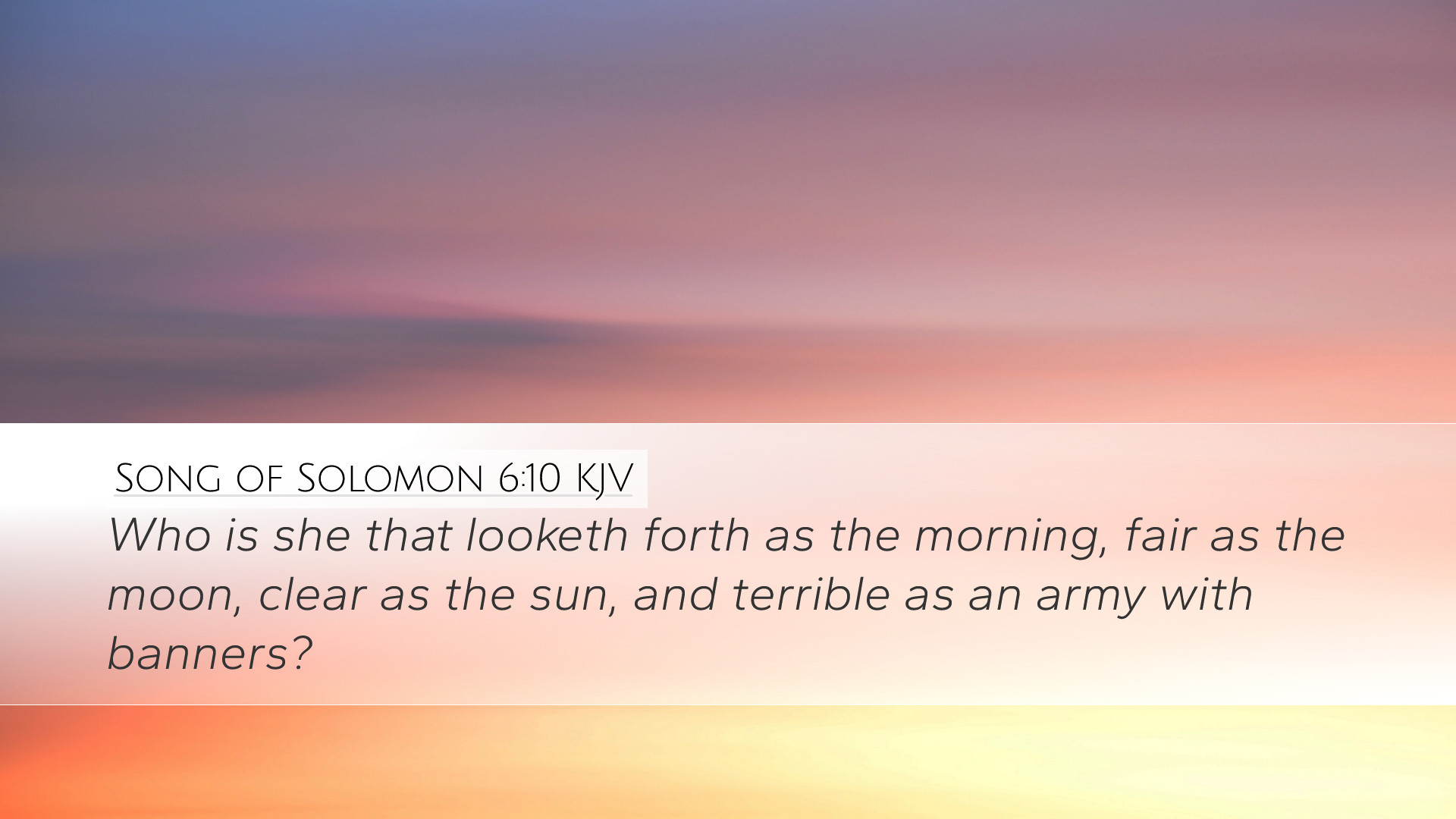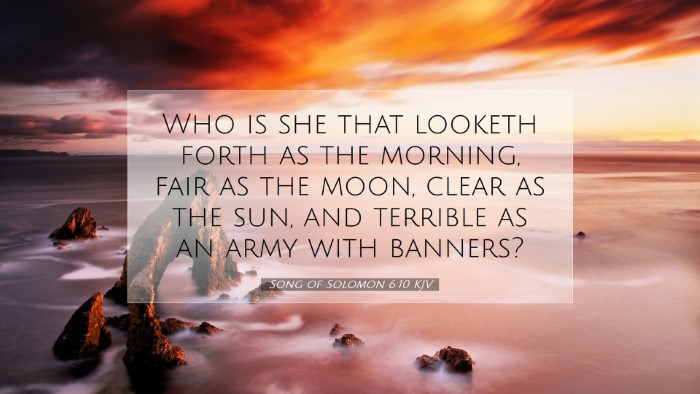Old Testament
Genesis Exodus Leviticus Numbers Deuteronomy Joshua Judges Ruth 1 Samuel 2 Samuel 1 Kings 2 Kings 1 Chronicles 2 Chronicles Ezra Nehemiah Esther Job Psalms Proverbs Ecclesiastes Song of Solomon Isaiah Jeremiah Lamentations Ezekiel Daniel Hosea Joel Amos Obadiah Jonah Micah Nahum Habakkuk Zephaniah Haggai Zechariah MalachiSong of Solomon 6:10
Song of Solomon 6:10 KJV
Who is she that looketh forth as the morning, fair as the moon, clear as the sun, and terrible as an army with banners?
Song of Solomon 6:10 Bible Commentary
Commentary on Song of Solomon 6:10
Verse Reference: Song of Solomon 6:10 (KJV) - "Who is she that looketh forth as the morning, fair as the moon, clear as the sun, and terrible as an army with banners?"
Introduction
The Song of Solomon, attributed to King Solomon, is a poetic celebration of love, characterized by rich imagery and symbolic language. In this particular verse, the Shulammite woman is compared to elements of nature and military might, portraying her beauty and strength. This commentary synthesizes insights from notable public domain commentators including Matthew Henry, Albert Barnes, and Adam Clarke to unpack the implications of this verse.
Exegesis and Meaning
Song of Solomon 6:10 serves as a rhetorical question that draws attention to the Shulammite. The question "Who is she?" not only highlights her individuality but also suggests that her beauty is both unique and extraordinary. This verse can be viewed through various lenses including theological, literary, and relational perspectives.
Theological Insights
- Divine Reflection: Matthew Henry notes that just as the Shulammite's beauty reflects the glory of God’s creation, believers are called to reflect divine qualities. The use of natural imagery—the morning, the moon, and the sun—suggests that God’s handiwork is present in human beauty.
- Symbolism of Light: Albert Barnes emphasizes the significance of light in scripture. The morning signifies new beginnings, hope, and purity; themes that resonate with the redeemed life in Christ. The moon and sun are symbols of consistency and stability in God's creation.
- The Terrible Beauty: Adam Clarke highlights the juxtaposition of beauty and might. The phrase "terrible as an army with banners" suggests that true beauty includes strength, protection, and a boldness that commands respect. This can be seen as a representation of the church, which is beautiful yet strong, reflecting the glory and power of its Lord.
Literary and Poetic Structure
Song of Solomon is rich in poetic devices, and Henry remarks on the elegance of the metaphors used. The comparison of the woman to celestial bodies positions her within a grand cosmic narrative:
- The Morning: Represents a freshness and a new day, suggesting the vitality and aliveness of love.
- The Moon: Often associated with gentleness and femininity, illustrating a softer side of beauty that complements strength.
- The Sun: Stands for brilliance and strength, reminding believers of the absolute sovereignty and radiant glory of God.
Relational Dynamics
In examining the relational aspects of this verse, it becomes evident that the expressions of love are steeped in admiration and respect. The speaker marvels at the Shulammite’s qualities, illustrating healthy romantic relationships built on mutual recognition of worth and beauty.
Characteristics of Ideal Love
- Admiration: The opening line invites readers to appreciate the singularity of the woman's beauty—suggesting that great love involves admiration of one another’s inner and outer qualities.
- Strength in Vulnerability: The comparison to an army may signify that while love can be delicate, it also possesses the strength to stand against adversity, encapsulating the dual nature of relationships.
Application for Today’s Readers
This verse has profound implications for contemporary believers, students, and theologians. The comparisons encourage individuals to consider how they perceive beauty—both in themselves and in others—and the spiritual significance behind such perceptions.
- Self-Identity: Encourages believers to view themselves as images of divine beauty and strength, fostering a positive self-image aligned with God’s views.
- Community Reflection: In the context of the church, it calls for mutual recognition of the diverse gifts and beauty within the body of Christ, promoting unity and strength in diversity.
Conclusion
Song of Solomon 6:10 invites us to reflect on the complexities of love, beauty, and strength. By appreciating the profound insights of public domain commentaries, we cultivate a deeper understanding of God’s design for relationships and the intrinsic beauty of those who are called by His name. Like the morning, moon, and sun, may we radiate the brilliance of divinely inspired love in our interactions and communities.


